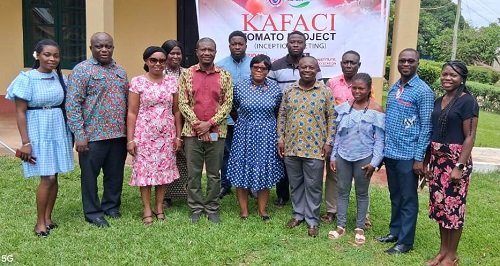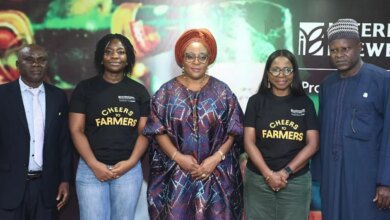CSIR, Korea team up to develop heat-tolerant tomatoes

A five-year project to develop heat-tolerant tomato varieties aimed at enhancing farmers’ incomes and strengthening national food security amid climate variability has been unveiled.
Titled “Development of Heat-Tolerant Tomato Varieties for Ghana”, the initiative is being implemented by the Crops Research Institute (CSIR-CRI) of the Council for Scientific and Industrial Research (CSIR).
It is supported by the Government of Korea through the Rural Development Administration (RDA) and the Korea-Africa Food and Agriculture Cooperation Initiative (KAFACI).
The project, valued at $25,000 per year, includes annual disbursements tied to specific progress milestones over the five-year period.
Speaking at the inception meeting at the CSIR-CRI Kwadaso Research Station in Kumasi, the Deputy Director of CSIR-CRI, Dr. Ernest Baafi, highlighted the strategic importance of the initiative.
He appealed to development partners and donors for additional support, emphasising that the project addresses longstanding challenges in Ghana’s tomato production landscape.
Dr. Baafi noted that tomatoes account for nearly 40% of household vegetable expenditure in Ghana.
However, national output has remained stagnant for over a decade, with domestic production consistently falling short of demand.
“As a result, imports continue to fill the gap, covering up to a quarter of national consumption,” he said.
He praised the Korean government and KAFACI for their continued support and called on all stakeholders — farmers, researchers, and extension officers — to collaborate closely for the project’s success.
The project is led by Dr. Michael Kwabena Osei, Principal Research Scientist and vegetable breeder at CSIR-CRI.
Under his leadership, the initiative adopts a comprehensive approach that includes on-farm trials, development of standardised cultivation technologies, and capacity building for farmers and extension agents.
Dr. Osei explained that the overarching goal is to breed and release tomato varieties capable of thriving under high temperatures and erratic rainfall — conditions increasingly prevalent due to climate change.
He reaffirmed the team’s commitment to developing climate-resilient tomato varieties and equipping farmers with the tools and knowledge they need to adapt and thrive.
The project also aims to promote climate-smart agricultural practices among smallholder farmers, standardise cultivation methods such as irrigation and organic soil amendments, and establish a sustainable seed system to ensure long-term impact.
Expected outcomes include increased crop resilience, improved yields, enhanced profitability for smallholder farmers, and reduced vulnerability to climate-related shocks.
The initiative is also expected to contribute significantly to Ghana’s broader goals of food and nutrition security and sustainable agricultural development.
Dr. Osei added that Ghana had been an active participant in the KAFACI programme, successfully completing two previous phases between 2011–2014 and 2020–2024.
From Kingsley E. Hope, Kumasi
🔗 Follow Ghanaian Times WhatsApp Channel today. https://whatsapp.com/channel/0029VbAjG7g3gvWajUAEX12Q
🌍 Trusted News. Real Stories. Anytime, Anywhere.
✅ Join our WhatsApp Channel now! https://whatsapp.com/channel/0029VbAjG7g3gvWajUAEX12Q






